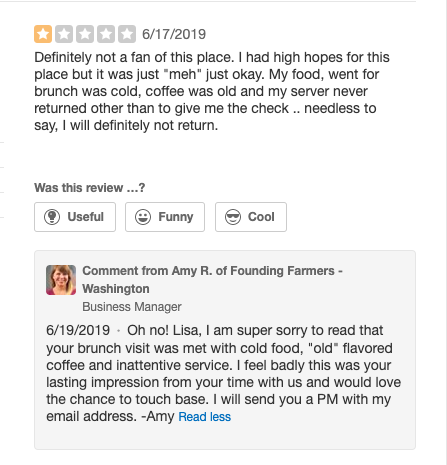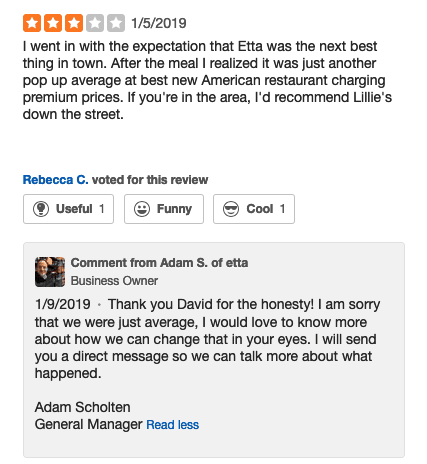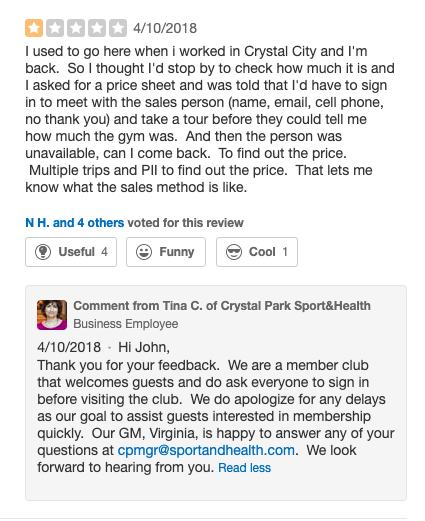You aren’t perfect, and neither is your business. And that’s okay. But it might not always FEEL okay when you’re scrolling through your brand’s Yelp feed and you come across a scathing and insensitive review or two. Especially considering that a whopping 86% of consumers read reviews for local businesses (including 95% of consumers aged 18 – 34), good reviews are even more important and bad reviews are even more toxic than ever. But errors are inevitable; maybe a vendor dropped the ball, a shipment went awry, or there was a technical mishap on your website. Regardless of what incited the bad review, customers are entitled to publish their opinions or experiences. And when these comments are more negative (or even brutal) in nature, your brand’s reputation is on the line.
So, what do you do when you are witnessing – seemingly powerlessly – the decline of your star count?
In its support center for business owners, Yelp offers some helpful tips for responding to reviews. They advise that, “The easiest way to respond to reviews is to imagine the reviewer is standing in front of you. Just like a face-to-face interaction, your best bet is to be sincere and open-minded when responding. It’s also important to be careful. Just like a text message, your meaning could be misinterpreted by the reviewer or others. Be thoughtful in your response.”
While keeping this carefulness and thoughtfulness in mind, we also have 5 additional tips that could help heal a reputation that has been tainted or tarnished by ruthless Yelpers:
1. Do not ignore bad feedback.
The beauty of the internet and social media is that they have empowered businesses to engage more directly and personably with their consumers. For this reason, we have seen heightened levels of direct engagement between companies and consumers, whether that be on an Instagram comment feed, on Twitter, or in the Yelp review section. Brands that build strong relationships with their consumers are more likely to stand the blow of a negative wind every now and then, and engaging with positive reviews is an important step to cultivating this bond.
With that being said, you should give just as much attention to negative feedback as you do to good feedback. Burying the review in Google’s search results or simply crossing your fingers and hoping it won’t be seen is neither a smart nor long-term solution. This “ignorance is bliss” approach will cultivate even stronger resentful feelings from the reviewer and will leave the impression on avid review hunters (because smart shoppers will find it!) that your company simply doesn’t care. Make it a priority to respond to all reviews (or at least as many as you can) in a timely manner – within 48 hours of when the review was posted is the most ideal time frame.

2. Acknowledge and apologize in a timely manner.
It’s important that consumers feel as though their emotions are validated and that their opinions are heard. Even though it can be easy to forget, reviewers are in fact HUMANS with feelings and sensitivities. Therefore, offering a sincere and unique apology for the error (not just a remark that’s copy and pasted into every response) can go a long way towards making amends. Of course, doing so first requires admitting that there was an error made and that your company is responsible for it; remember that these customers have given you their money and thus expect quality service in return. Acknowledging the mishap and apologizing for it is a much more productive step towards earning (or re-earning) trust and loyalty than engaging in a confrontational word war.
3. Recognize room for improvement.
Though it’s true that some reviews may be spiteful and that their criticisms might lack constructive thought, many might actually carry some weight that could help your business improve. Putting pride aside and reading reviews thoroughly and from the perspective that the customer is providing beneficial feedback will likely make the interaction more helpful in nature. Note exactly what the customer is saying and recognize the area that needs improvement. An even better approach would be to seek out ideas from the Yelper, either via direct message, over the phone, or in the public comment section; asking how they think that your company can do to optimize their processes will certainly make the customer feel like their opinions are not only heard, but are valued. If they make any helpful suggestions that could implemented, make sure to follow up on these and keep your word.

4. Offer solutions, not excuses.
This tip is relatively self-explanatory: even if the user’s review seems more emotional than constructive, responding with excuses will not get you far – especially with customers who are scrolling through your reviews. Remember that you are not only responding to the individual who offered the negative review, but you are also showcasing your communication skills to the rest of the Yelp audience. Even if your company is not truly at fault, offer a sincere apology and, if necessary, a discount code, a refund, or expedited shipping. Then describe exactly the plans that you will take to prevent this error from happening in the future. This communication demonstrates that you are intent on learning from their negative experience and taking action to ensure a more positive experience for other customers.
5. Write to the 90%.
According to Yelp, their engagement follows the 1/9/90 rule: 1% creates content, 9% edits content, and 90% simply consume content. Though it can be easy to feel as though your response will only be directed at the author of the bad review, the opposite is actually true: you are writing to the Yelp browsers – those who maybe have not yet had the pleasure of experiencing the services and products that your company offers. These readers are not biased and their opinions are malleable; therefore, it’s important that you win over these undecided votes. By being professional, impersonal, and passionate about your business, you are likely to make a stronger (and better) impression than the original bad review would have.

By staying on top of your Yelp reviews and making a sincere and strategic effort to respond to all reviews, you are giving your company the best chance of creating and maintaining a positive reputation. Although you cannot control the Yelp reviews that people leave, you are in control of if and how you respond.
If you are looking to better understand or improve your brand’s online reputation, there are an abundance of online management tools that can help you do so. Influencer Marketing Hub breaks the tools down into three categories: 1) discovering how your brand looks online, 2) seeking out more detailed information about your web presence, and 3) managing your online reputation. This collection of resources include both free and paid tools that can make your efforts easier. Leading the way are The Brand Grader (free), GatherUp, BrandYourself (free and paid), and Reputology. Check out this piece for more information: 10 Leading Online Reputation Management Tools for 2019.
Follow these tips and repeat as necessary to protect that precious star rating!

